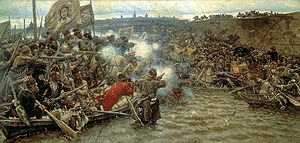- Battle of Chuvash Cape
-
Battle of Chuvash Cape Part of Russian conquest of Siberia 
The Conquest of Siberia by Vasily SurikovDate October 23, 1582 Location Qashliq, Siberia Khanate Result Decisive Russian victory, end of Kuchum’s power Belligerents Yermak's expedition Siberia Khanate Commanders and leaders Yermak Mametqul Strength 800 men several thousands Casualties and losses unknown unknown - Irtysh River
- Chuvash Cape
- Wagay River
- Irmen River
The Battle of Chuvash Cape (October 23, 1582) led to the victory of a Russian expedition under Yermak Timofeyevich and the fall of Siberia Khanate and the end of Khan Kuchum's power. The battle took place near Qashliq (Isker).
Contents
Context
After Kuchum seized power in Sibir, he attacked the nearby lands of Perm. Merchant Stroganovs, who explored Ural deposits, requested the Cossacks punish the Siberian Tatars. They equipped 540 men with arms and ammunition; later, 300 men joined the expedition.
Qashliq fortifications
The fortifications of Qashliq before the battle were deteriorating. Because a siege would be fatal for the Tatars, they decided to fight at the river bank, and hide ambushing forces behind the numerous fallen trees in the area. Although Tatar cannons were brought into position, they did not fire during the battle.
Battle
The Cossacks approached the bank, firing at the Siberians; the Siberians answered with arrows. However, Russian fire did not inflict many casualties among the Tatars, who hid among the trees.
The Siberians under Mametqul counter-attacked the Cossack expedition. The Cossacks positioned themselves in a square formation, and riflemen in the center opened fire. The Khanty and Mansi tribesmen who formed part of the Siberian ranks were mostly hunters; they had never participated in battles against soldiers equipped with firearms. Consequently, the tribesmen panicked and retreated. The rest of the Tatars proceeded with the offensive, but the Cossacks continued shooting, killing many Siberians. Mametqul was shot during the battle, and narrowly escaped capture; the Tatars evacuated him by boat.
After Mametqul was injured, the rest of the Siberian forces panicked and dispersed. Kuchum fled Qashliq, but the Cossacks chose not to pursue him. Instead, they retreated to Atik-town for the night.
Aftermath
After the defeat, Kuchum and some of his subjugates escaped to the Baraba steppe; however, most of locals refused to follow him. On October 26, the Cossacks entered Qashliq. The city was depopulated after the battle, although it was briefly repopulated from 1584 to 1586. After the battle, Siberia Khanate disintegrated, and most of its territory was annexed by Russia.
The conquest of Siberia is often compared with the Spanish conquest of the Americas. The conflict was provoked by individuals, as many conquistadors were, not states. Another notable popular belief[citation needed] is that the Siberians, like Native Americans, did not use fire-arms, leading to a Cossack victory. However, it is disputed.[citation needed]
References
- (Russian) Бой на Чувашевом мысу
Categories:- Khanate of Sibir
- 16th century in Russia
- Battles involving Russia
- Conflicts in 1582
- 1582 in Asia
- 1582 in Russia
- History of Siberia
Wikimedia Foundation. 2010.
